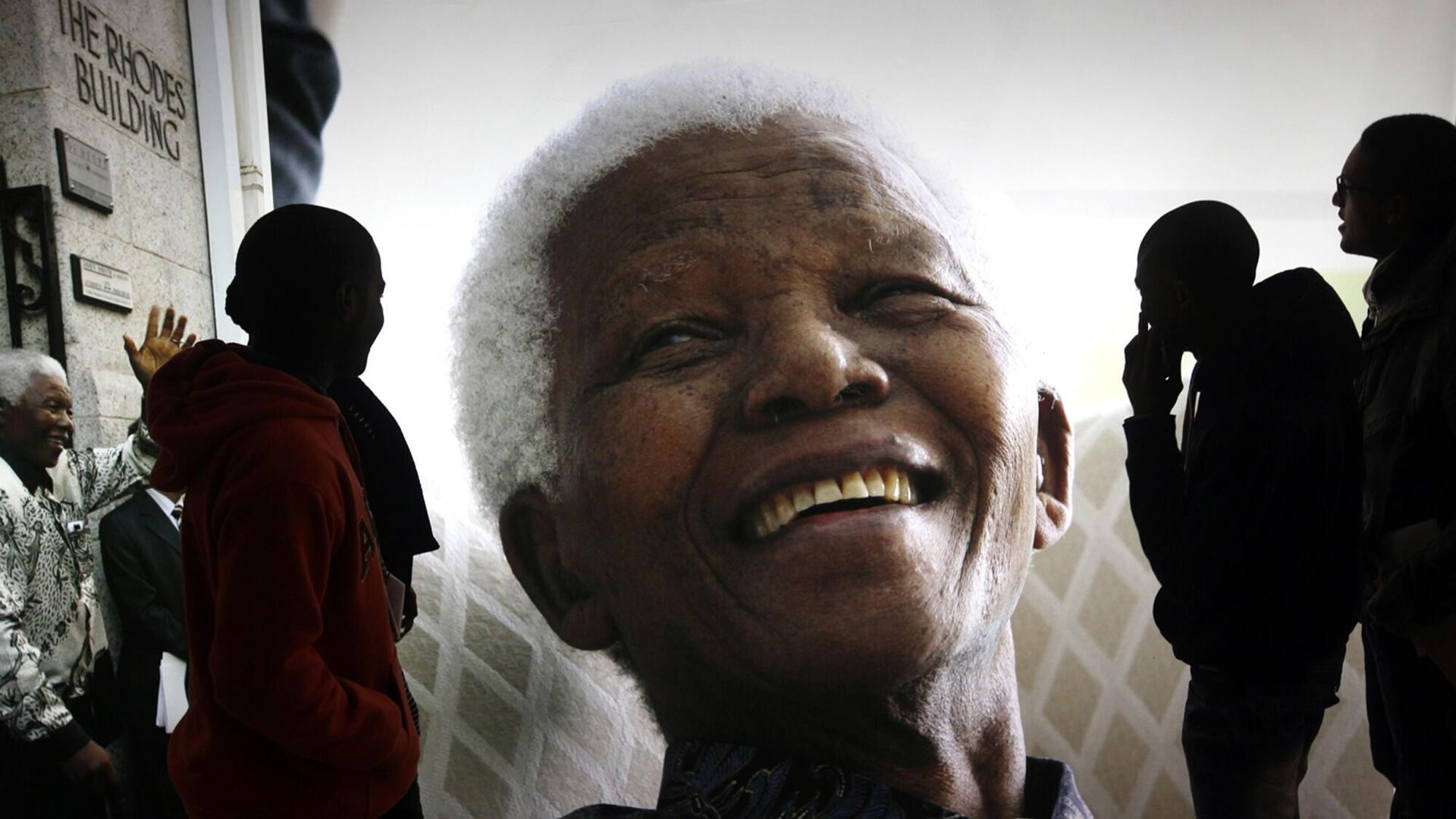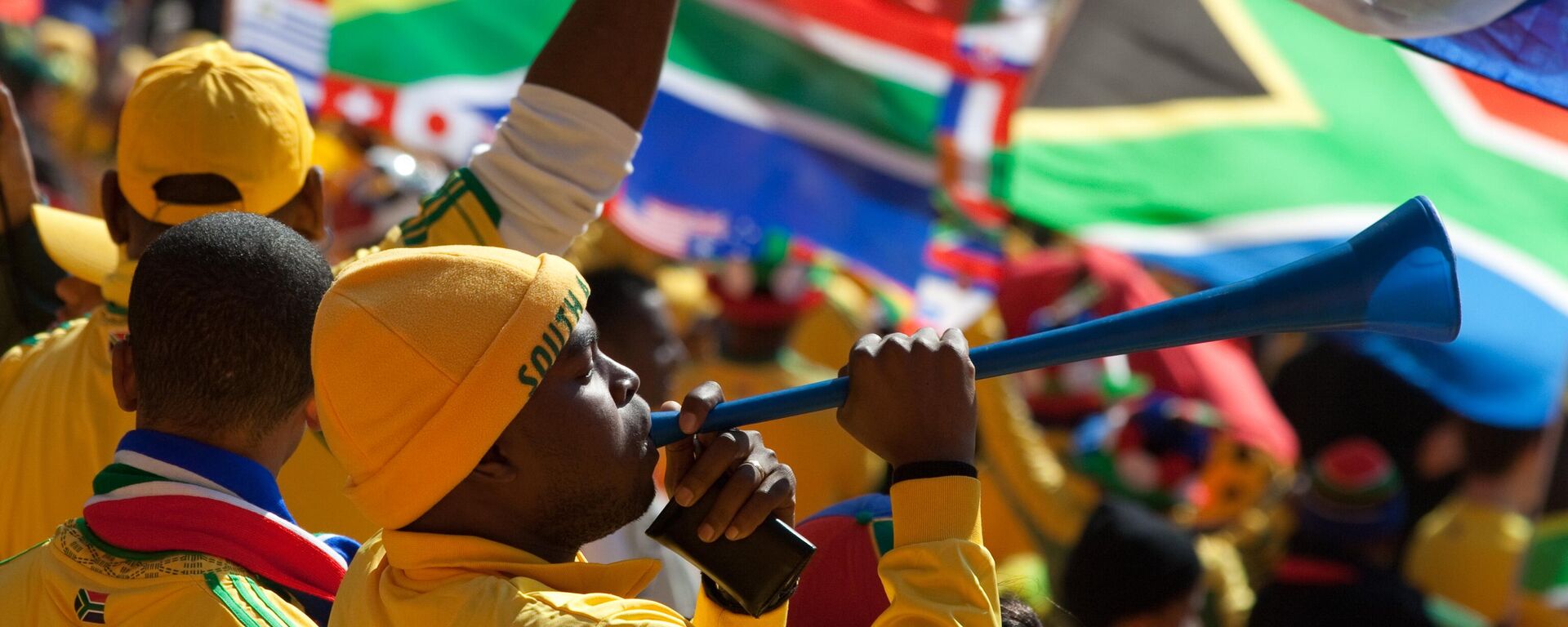https://en.sputniknews.africa/20230718/nelson-mandela-day-2023-south-africans-lasting-heritage-1060608688.html
Nelson Mandela Day 2023: South African's Lasting Heritage
Nelson Mandela Day 2023: South African's Lasting Heritage
Sputnik Africa
July 18 marks Nelson Mandela Day, the South African leader who dedicated his life to the struggle against injustice and the pursuit of a better life for... 18.07.2023, Sputnik Africa
2023-07-18T14:46+0200
2023-07-18T14:46+0200
2023-07-18T14:46+0200
features
nelson mandela
south africa
southern africa
national holiday
anniversary
apartheid
anti-apartheid struggle
https://cdn1.img.sputniknews.africa/img/07e7/07/12/1060610534_0:61:2001:1186_1920x0_80_0_0_90154c42f72090ace4def92d545b61f9.jpg
On Tuesday, the world commemorates the merits and historic legacy that South Africa's first black president left behind for his country and beyond.This date was selected for a reason: it was on this day 115 years ago that the great politician was born in Mfezo, a small village near Mtata (in what is now Eastern Cape Province).In 2023, the theme for Nelson Mandela Day is 'It's all in your hands'. The theme aims to raise awareness of how food affects climate change. The organizers also intend to plant one million trees around the world.The UN chief Antonio Guterres also commemorated the holiday, calling Nelson Mandela "a colossus of courage and conviction and a leader of immense achievement and extraordinary humanity."Mandela's journey, inherent in his quest for justice, fight for people's rights and desire to end the racist apartheid regime, has been a path marked by sacrifice, relentless struggle and, finally, triumph.In honor of the holiday, Sputnik Africa suggests tracing the path of Nelson Mandela to explore how meaningful this event is to South Africa and the world.Racial SegregationIn 1948, when Mandela was 30 years old, the National Party came to power in the Union of South Africa, proclaiming an official policy of racial segregation, or apartheid (separateness in Afrikaans). Under the system, white and black people in South Africa were prohibited from doing things together and had to live separate lives; white people were in charge of everything.In response to the unjust system, Mandela became active in the political life of the country and in 1952, he became one of the organizers of the Defiance Campaign to defy racial separation laws.ImprisonmentAfter the campaign and the government's shooting of a peaceful black protest demonstration in Sharpeville, Mandela grew convinced that non-violent resistance alone was not sufficient to overthrow apartheid and that armed struggle was also necessary. He helped found Umkhonto we Sizwe, or Spear of the Nation, a military wing of the African National Congress (ANC) that carried out sabotage attacks on government installations.In 1964, Mandela was convicted of treason and attempting to harm the government and sentenced to life imprisonment, which he spent on Robben Island. Most of the prisoners on the island off the coast of Cape Town were black men convicted of political offenses.While in prison, Mandela emerged as a character of resistance and hope for millions of people suffering under apartheid.Release From PrisonAfter 27 years in prison, Mandela was released in 1990 by South African President Frederick de Klerk, who also lifted the ban on the ANC that had been imposed by the government in 1960.Apartheid in South Africa ended a year later, in 1991, and three years after that the country held its first fully democratic elections in which blacks, like whites, were given the right to vote.Nelson Mandela was elected president of the country and attempted to unite people of different races. In 1993, he was awarded the Nobel Peace Prize for his struggle.Mandela's Legacy of Teaching 'Love'Addressing the nation on Tuesday, South African President Cyril Ramaposa said that largely due to the legacy of Nelson Mandela, South Africa's contribution to world peace is to support societies in conflict.Mandela's ideals, as the president noted, were striving for peace in the world, for an end to conflicts everywhere, and for a true international fellowship of humankind.These ideals have been relevant in the past, he said, and are even more relevant on Tuesday when many parts of the continent and the world are still gripped by conflicts.
https://en.sputniknews.africa/20230612/milestones--major-events-in-nelson-mandelas-life-1059861213.html
https://en.sputniknews.africa/20230616/south-african-activist-reflects-on-youth-day-as-reminder-of-past-generations-contribution-1059948222.html
south africa
southern africa
Sputnik Africa
feedback@sputniknews.com
+74956456601
MIA „Rossiya Segodnya“
2023
Maxim Grishenkin
https://cdn1.img.sputniknews.africa/img/07e7/0a/17/1063018107_0:0:1104:1103_100x100_80_0_0_03090c85a11f5d2e8a19cf1d989443c9.jpg
Maxim Grishenkin
https://cdn1.img.sputniknews.africa/img/07e7/0a/17/1063018107_0:0:1104:1103_100x100_80_0_0_03090c85a11f5d2e8a19cf1d989443c9.jpg
News
en_EN
Sputnik Africa
feedback@sputniknews.com
+74956456601
MIA „Rossiya Segodnya“
Sputnik Africa
feedback@sputniknews.com
+74956456601
MIA „Rossiya Segodnya“
Maxim Grishenkin
https://cdn1.img.sputniknews.africa/img/07e7/0a/17/1063018107_0:0:1104:1103_100x100_80_0_0_03090c85a11f5d2e8a19cf1d989443c9.jpg
nelson mandela, south africa, southern africa, national holiday, anniversary, apartheid, anti-apartheid struggle
nelson mandela, south africa, southern africa, national holiday, anniversary, apartheid, anti-apartheid struggle
Nelson Mandela Day 2023: South African's Lasting Heritage
July 18 marks Nelson Mandela Day, the South African leader who dedicated his life to the struggle against injustice and the pursuit of a better life for oppressed people and left a great mark on the consciousness of the world as one of the most notable politicians of the last century.
On Tuesday, the world commemorates the merits and historic legacy that South Africa's first black president left behind for his country and beyond.
This date was selected for a reason: it was on this day 115 years ago that the great politician was born in Mfezo, a small village near Mtata (in what is now Eastern Cape Province).
The United Nations declared the former statesman's birthday Nelson Mandela International Day in 2009.
In 2023, the theme for Nelson Mandela Day is 'It's all in your hands'. The theme aims to raise awareness of how food affects climate change. The organizers also intend to plant one million trees around the world.
On this day, the UN reminds everyone to take care of the planet, citing Mandela's words: "We must never forget that it is our duty to protect this environment."
The UN chief Antonio Guterres also commemorated the holiday, calling Nelson Mandela "a colossus of courage and conviction and a leader of immense achievement and extraordinary humanity."
Mandela's journey, inherent in his quest for justice, fight for people's rights and desire to end the racist apartheid regime, has been a path marked by sacrifice, relentless struggle and, finally, triumph.
In honor of the holiday,
Sputnik Africa suggests
tracing the path of Nelson Mandela to explore how meaningful this event is to South Africa and the world.
In 1948, when Mandela was 30 years old, the National Party came to power in the Union of South Africa, proclaiming an official policy of racial segregation, or apartheid (separateness in Afrikaans).
Under the system, white and black people in South Africa were prohibited from doing things together and had to live separate lives; white people were in charge of everything.
The majority black population could not, without special passes, work in or travel to areas where whites lived and had no access to quality healthcare, education, and transportation.
In response to the unjust system, Mandela became active in the political life of the country and in 1952, he became one of the organizers of the Defiance Campaign to defy racial separation laws.
After the campaign and the
government's shooting of a peaceful black protest demonstration in Sharpeville, Mandela grew convinced that non-violent resistance alone was not sufficient to overthrow apartheid and that armed struggle was also necessary.
He helped found Umkhonto we Sizwe, or Spear of the Nation, a military wing of the African National Congress (ANC) that carried out sabotage attacks on government installations.
In 1964, Mandela was convicted of treason and attempting to harm the government and sentenced to life imprisonment, which he spent on Robben Island. Most of the prisoners on the island off the coast of Cape Town were black men convicted of political offenses.
During his imprisonment, Mandela gained international fame, and in the 1980s refused an offer of his release in return for giving up his political struggle.
While in prison, Mandela emerged as a character of resistance and hope for millions of people suffering under apartheid.
After 27 years in prison, Mandela was released in 1990 by South African President Frederick de Klerk, who also lifted the ban on the ANC that had been imposed by the government in 1960.
His release was broadcast live around the world and celebrated throughout South Africa and beyond.
Apartheid in South Africa ended a year later, in 1991, and three years after that the country held its first fully democratic elections in which blacks, like whites, were given the right to vote.
Nelson Mandela was elected president of the country and attempted to unite people of different races. In 1993, he was awarded the Nobel Peace Prize for his struggle.
Mandela's Legacy of Teaching 'Love'
Addressing the nation on Tuesday, South African President Cyril Ramaposa said that largely due to the legacy of Nelson Mandela, South Africa's contribution to world peace is to support societies in conflict.
Mandela's ideals, as the president noted,
were striving for peace in the world, for an end to conflicts everywhere, and for a true international fellowship of humankind.
These ideals have been relevant in the past, he said, and are even more relevant on Tuesday when many parts of the continent and the world are still gripped by conflicts.
"No one is born hating another person because of the color of his skin, or his background, or his religion. People must learn to hate, and if they can learn to hate, they can be taught to love, for love comes more naturally to the human heart than its opposite," the grand politician and leader Mandela wrote.




